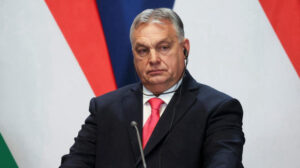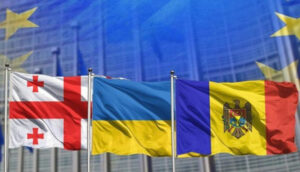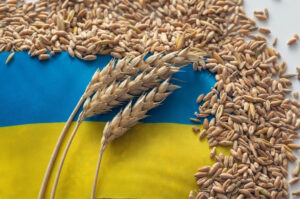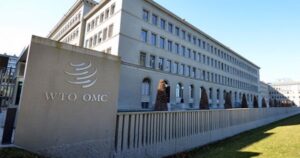
On his Facebook page, Hungarian Prime Minister Viktor Orban wrote 12 points of expectations of the Hungarian people from Brussels, including “the union, but without Ukraine.” Here are the points listed in the post:
– we want a Europe of nations;
– We want equality before the law for all member states;
– return to the member states the illegally taken away powers;
– national sovereignty, strong veto power for national governments;
– exclude Soros agents from the European Commission and corrupt lobbyists from the European Parliament;
– the future of our grandchildren should not be mortgaged;
– not to prevent our National Guard from defending our borders. Do not accept migrants, take away illegal immigrants from us;
– “corrupt” dollars and euros should not enter EU member states;
– prohibit the “unnatural” re-education of our children;
– we want to protect the Christian heritage of Europe;
– demand peace in Europe;
– Union, but without Ukraine.

On November 16, Brussels will host the Kyiv Investment Forum 2023, which this year will focus “on long-term strategies for the sustainable recovery and development of the Ukrainian capital, as well as its integration into the global economic space,” the press service of the Kyiv City State Administration (KCSA) reports.
“The forum will take place on November 16 in Brussels and will bring together city leaders, European and Ukrainian politicians, leading economists, investors and urbanists,” the KCSA said on Wednesday, citing the Department of Economics and Investments, which is organizing the event.
The forum’s main session will reportedly focus on Europe’s changing geopolitical landscape and the growing importance of megacities. Participants will examine the challenges of conflict and war, emphasize the value of sustainable development and the recovery of war-affected communities. It will include four panel discussions and two sections on challenges and problems in both wartime and post-war.
The Forum will also include a panel discussion on investments in transformation, including business ecosystems and innovation clusters.
“A separate discussion will be devoted to restoring the mental health of the population, social integration and adaptation of veterans and people affected by wars

Brussels will continue to support Moldova, Ukraine and Georgia in carrying out pro-European reforms, according to a statement issued on Friday following the EU summit.
“The European Union will continue to work closely with Ukraine, Moldova and Georgia and support their reform efforts on their European path,” it said.
The statement says that the meeting also decided that Brussels will support Moldova in addressing the challenges it faces due to the events in Ukraine.
Last March, Georgia applied for EU membership, but has not yet been granted candidate status.
In February 2022, Ukrainian President Volodymyr Zelenskyy signed Ukraine’s application for EU membership. In June of the same year, the EU Council granted Ukraine candidate status.
In June 2022, Moldova was also granted candidate status.

Following the meeting of the coordination platform on Ukrainian grain exports, no decision was made on whether or not to extend the current temporary ban on grain imports to Poland, Hungary, Romania, Slovakia and Bulgaria, which expires on September 15.
This was reported to Interfax-Ukraine on Wednesday after the 9th meeting of the joint coordination platform, chaired by the head of the cabinet of the Vice President of the European Commission Valdis Dombrovskis, Mr. Hager.
According to her, the first part of the meeting was attended by representatives of five member states, Ukraine, the Republic of Moldova and the Commission. “The Commission presented the latest forecasts of the market situation in terms of harvest, trade and prices. Countries were invited to share the latest information. The platform also discussed how to increase storage capacity and reduce border crossing time. Finally, they exchanged views on short-term actions to facilitate trade flows and on ways to support transport,” the EC representative said about the content of the first part of the platform meeting.
According to Garcia, the second part of the meeting, which was attended by representatives of Estonia, Latvia, Lithuania, Greece, Italy and Croatia, was devoted to alternative routes.
“In the context of this meeting, the Commission informed that no decision has yet been made on preventive measures, the phased abolition of which is scheduled for September 15, 2023. In any case, the Platform will continue to meet regularly and monitor grain imports from Ukraine,” the European Commission representative stated.
As you know, in May 2022, the EU decided to temporarily suspend import duties, quotas and trade remedies on Ukrainian exports to the European Union – known as autonomous trade measures – to help alleviate the difficulties faced by Ukrainian producers and exporters after the Russian invasion. At the same time, following logistical problems in Bulgaria, Hungary, Poland, Romania, and Slovakia caused by imports of wheat, corn, rapeseed, and sunflower seeds originating in Ukraine, exceptional and preventive measures on their imports came into force on May 2, 2023, and were extended on June 5.

Ukraine may file a lawsuit against Brussels and European Union member states at the World Trade Organization (WTO) if they do not lift restrictions on the export of its agricultural products after September 15, Taras Kachka, Deputy Minister of Economy and Trade Representative of Ukraine, told Politico.
“With full respect and gratitude to Poland, if any bans are imposed after September 15, Ukraine will file a lawsuit against Poland and the EU at the World Trade Organization,” he said.
Ukraine’s trade representative insists that these restrictions violate the Free Trade Agreement, which has been in place between Ukraine and the EU since 2014.
“We do not intend to take immediate retaliatory measures, given the spirit of friendship and solidarity between Ukraine and the EU,” Kachka explained, adding that a systemic threat to Ukrainian interests would force Ukraine to take the case to the WTO.
In addition, Kachka told the newspaper that there is no evidence of price deviations or a significant increase in grain supplies to justify the extension of import restrictions. Kyiv has engaged in “constructive cooperation” with the European Commission, five EU member states, and Moldova, a key transit hub for Ukrainian exports to the EU.
“We have received significant support for ensuring better transit of goods through the territory of neighboring member states, including Poland and Hungary. In the last two months, we have made significant progress in cooperation with Romania on the transportation of goods from Ukraine,” Kachka said.
As reported, Deputy Head of the Presidential Office Ihor Zhovkva said in an interview with Interfax-Ukraine that if Brussels fails to take action against Poland, Hungary, Bulgaria, Slovakia and Romania, which violate the trade agreement, Kyiv “reserves the choice of legal mechanisms for response.”
Ukraine’s Foreign Ministry noted that Kyiv reserves the right to initiate arbitration proceedings under the Association Agreement with the EU or to apply to the WTO.
Source: https://www.politico.eu/article/ukraine-eu-wto-poland-hungary-grain-curbs/